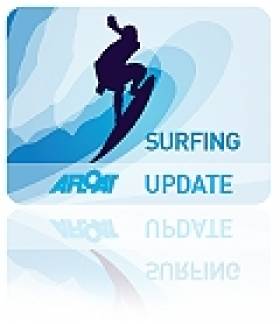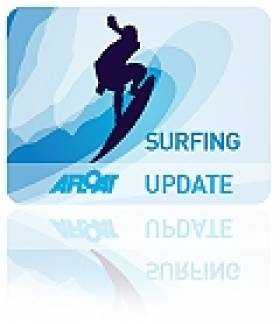Displaying items by tag: Aileens
Clare's Big Wave Secret Among Top Surf Destinations
#Surfing - One of big wave surfing's best kept secrets off the Clare coast has seen the area named among the top surf spots in the UK and Ireland, as the Clare Herald reports.
Easkey in Co Sligo and The Peak in Bundoran, Co Donegal also made the grade alongside Aileens, a renowned offshore swell only accessible to those in the know, in the list put together by Surfholidays.com.
The Clare Herald has more on the story HERE.
Spectacular Winter Surfing Captured On Video At Home And Abroad
#Surfing - Iceland, of all places, may not be known as a surfing hot-spot - but Irish wave rider Eoin McCarthy Deering has made something of the freezing swell, as the video above demonstrates.
The clip, via IrishCentral, was captured using one of the now ubiquitous GoPro portable HD cameras that enable extreme sports enthusiasts to record footage right from the centre of the action.
Closer to home, Epic TV reports on yet more incredible sessions at Mullaghmore Head and Aileens, this time by visiting surf pros Kohl Christiansen and Aritz Aranburu - see the videos below.
Christiansen took on the giant waves off Sligo - which are featured once again among the nominees for the Billabong XXL Big Wave Awards - while Aranburu headed to Clare with British rider Tom Lowe for a run at the famed surf break.
Kohl Christiansen at Mullaghmore Part 1:
Kohl Christiansen at Mullaghmore Part 2:
Aritz Aranburu at Aileens:
French Surfer Rides the Big One Off West of Ireland
#SURFING - Surfing website MagicSeaweed captured French surf pro Justine Dupont in top form at Aileens off the West of Ireland on Sunday 21 October.
The 21-year-old paddled out to the secret big wave surfing spot with 2011 Billabong XXL Biggest Wave Award winner Benjamin Sanchis, where they promptly broke their boards caught in the biggest barrels of the day.
Turning their attentions instead to the "infamous cold water right-hander", Dupont was towed into a stunning 12-foot tunnel of water - as the video above shows.
"It was more than a session, it was a mission," said Dupont. "From getting smashed paddling out to surfing that perfect beautiful wave, it was a day I’ll never forget."
MagicSeaweed has photos and video of Dupont's Aileens adventure HERE.






























































